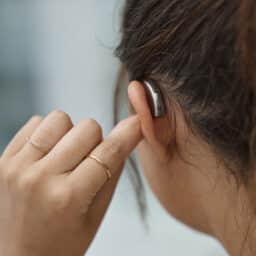Four Signs It’s Time for an Audiology Appointment

Scheduling a doctor’s appointment isn’t usually something people look forward to, but regular check-ups are an essential part of staying healthy. Most people make it a priority to visit the dentist twice a year and have an annual eye exam, yet they often overlook audiology appointments. Just like dental and vision care, hearing health plays…
How To Create the Perfect Hearing Loss-Friendly Valentine’s Date

February 14th is Valentine’s Day, the perfect opportunity to show your partner how much you love and appreciate them. For the 15% of U.S. adults with hearing loss, however, many of those Valentine’s date ideas can feel out of reach. Let’s take a look at four ideas to help you plan the perfect hearing-loss-friendly Valentine’s…
What To Expect From Your First Hearing Aids

Approximately 28.8 million U.S. adults could benefit from hearing aids. If you’re about to get your first pair, it’s crucial to set realistic expectations for what they’ll feel and sound like. Let’s take a look at a few things to expect from your new devices. Choosing Your Hearing Aids The process starts with finding the…
How Do I Tell My Child They Have Hearing Loss

Hearing loss in children can feel overwhelming for families, especially when it’s time to explain it to the child. The good news is that your support can make a world of difference. Let’s explore how to explain hearing loss to your child, provide meaningful emotional support and introduce hearing aids in a way that gives…
Boost Your Confidence: Navigating Social Situations With New Hearing Aids

Getting your first pair of hearing aids is an exciting milestone, but it can also feel like stepping into uncharted territory. Along with the excitement of hearing your favorite sounds again comes a bit of a learning curve. You’ll need to adapt to amplified noises, establish a cleaning routine and become comfortable with how the…
How to Communicate your Hearing Needs This Holiday Season
While the holidays are full of magical, memory-making get-togethers, they can also include plenty of background noise, dim lighting and large groups, making communication challenging for people with hearing loss. Want to make it easier? Reach out to your support system (family, friends, whoever’s got your back) via email, letter or in person before the…
Hearing Loss and Thanksgiving Shopping: Challenges and Solutions

Thanksgiving brings a whirlwind of activity, especially in the grocery store. Whether you’re stocking up on potatoes, cranberries or the perfect pumpkin pie ingredients, holiday shopping can be hectic for anyone. However, for the 44.1 million American adults with hearing loss, this experience presents unique challenges beyond the usual holiday crowds. Let’s explore how hearing…
How to Communicate Effectively with Family Members Who Have Hearing Loss
When a family member has hearing loss, it can create challenges in communication. With the right approach, you can foster better understanding and connection. Here are some key strategies to improve communication with family members who have hearing loss. Practical Tips for Clearer Communication Simple adjustments can go a long way in improving the way…
New Research Shows Promise in Restoring Auditory Function
According to the World Health Organization, by 2050, 1.5 billion people are expected to have some degree of hearing loss. Many of these cases stem from damage to the delicate inner ear hair cells that transmit sound signals to the brain. When these cells are damaged due to age, noise exposure or illness, they do…
Yard Care and Hearing Protection: What to Know
With falling leaves and winter preparations, autumn is a busy time for lawn care and people don’t often think about the impact the work could have on their hearing. Yard work is a necessary task, and the loud equipment often used, like leaf blowers, lawnmowers or chainsaws, poses risks to your hearing health. Here’s how…
